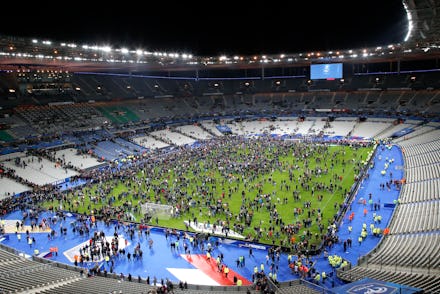Terrorism and Euro 2016: What the ISIS Attacks Mean for the Upcoming Soccer Tournament

In the summer of 2010, within the al Shabaab extremist group-controlled areas of Somalia, watching the World Cup placed many civilians at the risk of flogging, amputations and even executions. To the people in power, football – or soccer as it's known in the United States – infringed on their ambitions, namely that of jihad, or holy war, and it had to be stamped out.
With Europe once again on high alert following the deadly terrorist attacks in Brussels on Tuesday, which left 34 people dead and more than 230 wounded and came on the heels of November's ISIS attacks in Paris, officials have raised concerns that terrorists could target the upcoming Euro 2016 tournament. The competition, which pits the best international teams in Europe against one another every four years, will be hosted in 10 stadiums across France, beginning on June 10.
"It has to be a concern because we know that ISIS is looking for soft targets," Margaret Gilmore, senior associate fellow at the Royal United Services Institute, said Wednesday. Thus, attacking a football event, like Euro 2016, would have great value for a terrorist group, given the sport's popularity and what it represents to some extremists.
Certain extremist groups have long viewed football as contradictory to their messages of strict religious adherence and conformity. From their perspective, football represents Western ideals, and the cross-cultural assimilation it engenders is counter to their ideological values. As a result, for those groups — namely, al Shabaab and Boko Haram in Africa and the Islamic State group, also known as ISIS, in the Middle East — attacking football sends a message beyond invoking fear.
There have been several instances where football was at the backdrop of terrorist attacks in Europe. In 2002, a car bomb was detonated outside of the Santiago Bernabeu stadium in Madrid, where Real Madrid plays their home games. Most recently, in November, three suicide bombers tried to enter the Stade de France, where a France-Germany football match was taking place, as part of the widespread Paris attacks. A similar plan was thwarted that same month for an international match in Hanover, Germany.
For these groups, football is an invitation from "the infidels" and is viewed as a "detraction from their religious obligations," James M. Dorsey, senior fellow at the S. Rajaratnam School of International Studies at Singapore's Nanyang Technological University and creator of The Turbulent World of Middle East Soccer blog, said on Wednesday.
That's not to say extremists' relationship with football isn't complicated. Four years after al Shabaab was executing Somalis for watching the World Cup, the group actively began organizing its own football matches — including games with locals — albeit with highly limited regulations. This was, in part, because the people making the rules themselves enjoyed the sport.
ISIS purportedly has 400 fighters trained to attack Europe in semi-autonomous cells scattered across parts of Europe. This leaves countries like France and Belgium particularly vulnerable to attacks because of their open border policy and stated commitment to bringing in refugees — something that could mean more terrorists crossing their borders from North Africa. In contrast, the United Kingdom was better protected against attacks for the 2012 Olympics, in part because they had stricter border regulations in place.
However, France wouldn't have earned the Euro bid without a strong, detailed security plan, Gilmore said. For their part, French Interior Minister Bernard Cazeneuve has said they will put everything in place so they can guarantee "collective security" for the monthlong tournament. This includes the government hiring 10,000 people for private security — with organizers hoping for more planned hires before June — and over 900 agents mobilized across the country for the 51 scheduled matches.
Similarly, UEFA — the organizer of the European competition — have stated that safety and security are at the center of its plans.
UEFA has no current plans to hold the tournament behind closed doors — a tactic which has been used for single-event football matches before. For the sake of the safety of fans, though, Republic of Ireland manager Martin O'Neill has said he would be willing to let his team compete, begrudgingly, under the policy. "If that is an alternative and it's the only alternative, then if we are going to have the competition, we may have to comply with it," O'Neill said, in an interview with the Irish Independent.
But being the first tournament closed to the public is antithetical to the spirit of Euro 2016 and, more broadly, the sport. "If you're going to hold a Europe-wide tournament, and you're going to exclude the public, you've defeated the purpose of the tournament," Dorsey said. "You've handed your opponents — in this case groups that commit political violence — you've handed them a victory on a silver platter."